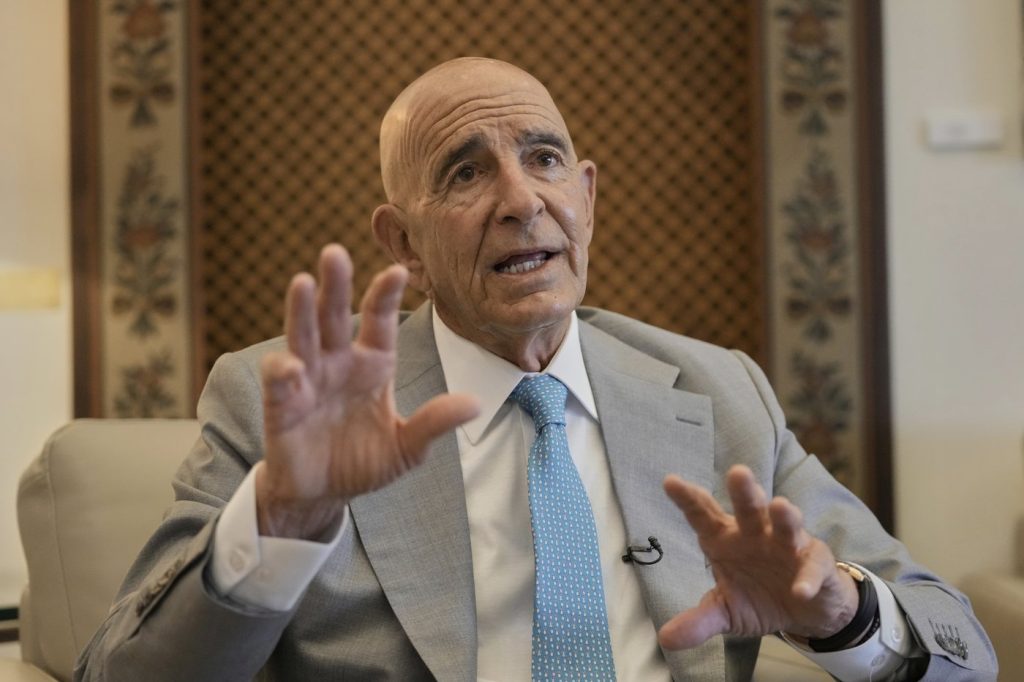BEIRUT (AP) — A U.S. envoy reaffirmed Washington’s commitment to collaborating with the new government in Syria, emphasizing on Monday that “there is no Plan B” for uniting the country, which is still suffering from the aftermath of a nearly 14-year civil war and is currently facing renewed outbreaks of sectarian violence. The envoy, Tom Barrack, who serves as the U.S. ambassador to Turkey and special envoy to Syria, addressed these issues during an exclusive interview with the Associated Press in Beirut.
Barrack critically assessed Israel's recent military intervention in Syria, describing it as poorly timed and complicating efforts to stabilize the region. His remarks came in the context of ongoing clashes in southwest Syria, particularly in the Sweida province, where militias of the Druze religious minority confronted local Sunni Muslim Bedouin tribes. The violence has resulted in numerous casualties, with Syrian government forces initially intervening in an attempt to restore order but ultimately siding with the Bedouins.
Israel's involvement included launching airstrikes on Syrian military convoys in Sweida and targeting the Syrian Ministry of Defense headquarters in Damascus last week, a move reflective of its historically supportive stance towards the Druze community, which has ties to Israel. Over the weekend, Barrack announced a ceasefire agreement between Syria and Israel, signaling a temporary halt to hostilities, although specifics of the agreement remain sparse.
In his comments to the AP, Barrack condemned the violence as “intolerable” and acknowledged the challenges faced by the current Syrian government in attempting to foster unity among the diverse population. He pointed out that while Israel's strikes were conducted independently of the U.S., their timing exacerbated the already complex situation.
Prior to the eruption of violence in Sweida, discussions on security matters had been progressing between Israel and Syria, with the U.S. advocating for normalization of diplomatic relations. Barrack noted that Israel is particularly cautious about military actions in areas south of Damascus, where it believes any military activity must be agreed upon with them. However, he also suggested that the new government in Syria did not share this perspective, creating friction regarding territorial security.
The ceasefire agreement specifically addresses the Sweida conflict but does not encompass broader issues such as the demilitarization of areas near Damascus, sparking concerns about future relations between Israel and Syria. In the discussions leading up to the ceasefire, Barrack stated that both parties strived to address the movement of forces between Damascus and Sweida.
In addition to tensions rooted in recent violence, longstanding distrust persists among minority religious and ethnic groups towards the Syrian government, particularly since the regime transitioned into the hands of Sunni Muslim former insurgents who displaced Bashar Assad. Meanwhile, negotiations between the Assad government and Kurdish forces continue, aiming for the integration of U.S.-backed Kurdish-led Syrian Democratic Forces into the new national army.
Barrack mentioned having discussions with SDF leader Mazloum Abdi over the weekend, expressing optimism that the ongoing violence would not hinder those negotiations, anticipating potential breakthroughs in the near future. Meanwhile, Turkey, which maintains tense relations with Israel while seeking to limit Kurdish influence along its border, has offered defense assistance to Syria, though Barrack emphasized that the U.S. has no official stance on such a defense agreement.
Overall, the multifaceted situation in Syria continues to evolve, underscored by internal conflicts and external influences, highlighting the intricate dynamics at play as various entities navigate the complexities of regional politics.











